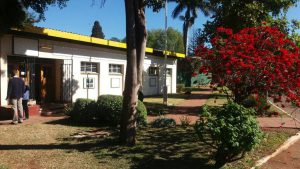Walter Mswazie/ Munyaradzi Musiiwa/Austin Nyathi Chronicle Reporters
NEARLY 7,000 cattle have died in parts of Matabeleland South, Masvingo and the Midlands provinces due to inadequate pastures and acute water shortages.
In Masvingo, an estimated 5,000 cattle cattle have died due to drought amid reports that Mwenezi, Chivi, Bikita, Masvingo’s Somerton and Nyikavanhu areas have been losing nearly five cattle each week since November. Over 1,300 cattle have been lost in the Midlands province and 453 in Matabeleland South.
Farmers are grappling with a devastating drought, nearly a quarter of a century after the 1992 drought, considered the worst in living memory, that wiped out nearly one million cattle and food stocks, reducing a country that had come to be known as the “bread basket of Southern Africa” as a result of surplus harvests for successive years since independence in 1980, to a net food importer.
Masvingo Beef Farmers Association chairman Robert Makado gave a gloomy picture of the situation.
He said stock feed is only available in a few areas that include Chivi, Mwenezi and Chiredzi, with a 50 kg of stock feed going for about $8, 50.
Makado appealed to companies such as Tongaat Hullet to provide farmers with sugar by-products to save their cattle. He also implored the government to rehabilitate boreholes so that they can provide water for the animals to drink.
“According to our snap survey, cattle amounting to more than 5,000 have since succumbed to drought. Most areas lose five cattle a week,” said Makado.
Masvingo has an estimated herd of 1, 2 million cattle while the national herd stands at about 5 million cattle.
“We’re appealing to sugarcane giant Tongaat Hullet to enhance their feedlot activities and include many farmers. The company should also assist farmers by providing them with the sugarcane by-products and molasses on which cattle can feed,” said Makado.
In the Midlands province, over 1,300 cattle are said to have died in Mberengwa and Zvishavane Districts.
The Midlands Minister of State for Provincial Affairs, Cde Jason Machaya, said 560 cattle were reported to have died in Mberengwa, 450 in Zvishavane District, with Shurugwi recording 110 deaths as at January 8.
Cde Machaya said the major cause of the deaths of cattle was lack of pastures and acute water shortages which he said had been exacerbated by the dry spell and below average rains.
“There are over 1,300 reported cases of cattle deaths in the province. Mberengwa alone has recorded 560 deaths and Zvishavane recorded 450 while Shurugwi recorded 110 cases. Gweru has 90 deaths while Gokwe North has 38, Kwekwe has 14, Gokwe South has 18 and Chirumanzu recorded 18 deaths,” he said.
“This is mainly due to water shortages and inadequate pastures. There is a need for government to move in immediately to save the provincial herd.”
Cde Machaya said the province was in the process of identifying farms that had small herds with abundant pastures so that cattle from the most affected areas such as Mberengwa and Zvishavane could be relocated to those farms.
“The government has embarked on a supplementary feeding programme where it’s selling stock feed at subsidised prices to save the cattle. Tomorrow (today), we’ll convene a meeting with the veterinary services department, livestock department and other stakeholders to identify farms that have pastures but with small herds so that they can accommodate cattle from other areas where pastures are now scarce,” he said.
In Matabeleland South, 452 cattle were said to have died between last October and this month as the drought takes its toll.
Matabeleland Provincial Livestock Specialist, Hatitye Muchemwa Zondai, told a drought relief meeting held in Gwanda that if there are no meaningful rains in the next six weeks , 86 percent of the province`s cattle population, which stands at 684,000, would die.
“A total of 452 cattle died between October 2015 and January 2016 and the hardest hit districts are Matobo with 182, Bulilima with 76, Mangwe with 72 and Gwanda with 70,”said Zondai.
“588,240 are also at the risk of dying if we don’t receive rains in the next six weeks.”
He said as a drought mitigation measure, the Food and Agriculture Organisation of the United Nations and World Vision were conducting a Livestock Mitigation Programme (LMP) targeting communal farmers in the province.
Zondai urged farmers to embrace the programme which was aimed at saving their livestock from imminent death.
He said the programme would see farmers buying stock feed at subsidised prices of between $7 and $8 per 50 kg bag.
“The programme which started in November last year and ends in April this year is being carried out in four districts, namely Gwanda, Beitbridge, Matobo and Umzingwane,” Zondai said.
He also urged the government and other development players to consider drilling more boreholes as a way of augmenting water supplies for both humans and livestock.
The livestock specialist added that farmers should practise controlled destocking and sell their cattle when they were still in good shape so that they may get good returns.
Zondai said farmers should avoid using unscrupulous middlemen when selling their livestock whom he said were bent on fleecing them.


